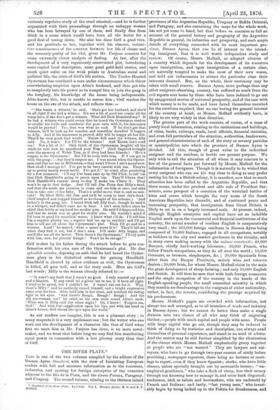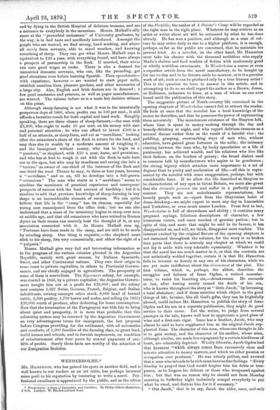THE RIVER PLATE.*
Tuis is one of the two volumes compiled by the editors of the Buenos Ayres Standard, with the view of furnishing European readers with full and accurate information as to the resources, industries, and opening for foreign enterprise of the countries adjacent to the Rio de la Plata, and the rivers Parana, Paraguay, and Uruguay. The second volume, relating to the thirteen inland
•
handbook of the Meer Plate. In 2 vols. Vol. I. Buenos Ayres: M. G. and E. T. Ifulhan.
provinces of the Argentine Republic, Uruguay or %Ada Oriental, and Paraguay, and also containing the maps for the whole work, has not yet come to hand, but that before us contains so full an account of. the general history and geography of the Argentine Republic in general, its industries and prosperity, and such ample details of everything connected with its most important pro- vince, Buenos Ayres, that can be of interest to the intend- ing immigrant, that it is well worth independent study and review. Of course, Messrs. Mulhall, as adopted citizens of a country which depends for the development of its resources upon immigration, and upon immigration of a certain class, are naturally tempted to make the most of their own wares, and hold out inducements to attract the particular class their interests demand. But, on the whole, their testimony may be taken with small reserve. Buenos Ayres, more perhaps than any other emigrant-absorbing country, has suffered so much from the evil reports sent home by those who have been induced to go out by exaggerated stories of universal prosperity, and of the ease with which money is to be made, and have found themselves unsuited for the exertions required, that no one having the general interest of the country at heart, as Messrs. Mulhall evidently have, is likely to err very widely in that direction.
The greater part of the work consists, of course, of a mass of purely local information, relating to the institutions and buildings, of cities, banks, railways, roads, local officials, financial statistics, and even full particulars of the situation, authorities, landowners, and general characteristics of each of the sixty or seventy partidos or municipalities into which the province of Buenos Ayres is divided. All this, though of great value to the individual emigrant and the resident, is beside our present purpose. We only wish to call the attention of all whom it may concern to a few of the general facts put forward by Messrs. Mulhall for the information of foreigners. Though it is naturally to be wished that every emigrant who can see his way clear to doing so may prefer casting his lot in a British colony, it is manifest, now that so much attention has been called to the Argentine Republic, and that there seems, under the prudent and able rule of President Sar- miento, some prospect of a cessation of the wretched battles of kites and crows which brought the very name of the South American Republics into discredit, and of continued peace and increasing prosperity, that immigration from Great Britain is likely to set in on a largely increased scale. At present, indeed, although English enterprise and capital have set an indelible English mark upon the commercial and financial institutions of the country, the actual number of resident English is comparatively very small ; the 250,000 foreign residents in Buenos Ayres being composed of 70,000 Italians, engaged in all occupations, notably as builders in the city and market gardeners in the vicinity, and in many cases making money with the animus revertendi ; 40,000 Basques, chiefly hard-working labourers ; 30,000 French, who follow French occupations, as they do all over the world ; 10,000 Germans, as brewers, shopkeepers, &c. ; 30,000 Spaniards from other than the Basque Provinces, mainly wine and tobacco dealers ; 30,000 Irish, for whom Messrs. Mulhall claim in the main the great development of sheep-farming ; and only 10,000 English and Scotch. It will thus be seen that with both foreign commerce and the staple occupation of the country in the hands of the English-speaking people, the small numerical minority in which they stand is no disadvantage to the emigrant of either nationality, rather, in fact, the reverse, considering the prestige acquired by his predecessors.
Messrs. Mulhall's pages are crowded with information, not always too well arranged, as to all branches of trade and industry in Buenos Ayres ; but we cannot do better than make a single division into two classes of all who may think of migrating thither,—people with much capital and people with none. People with large capital who go out, though they may be induced to think of doing so by statistics and description, can always avail themselves of personal experience, and stand in no need of advice.
And the matter may be still further simplified by the elimination of the classes which Messrs. Mulhall emphatically group together as people who are "not wanted." They are lawyers and sur- veyors, who have to go through two-year courses of study before practising ; newspaper reporters, there being no lectures or meet- ings to report, even if they know Spanish ; clerks, who have little chance, unless specially brought out by mercantile houses ; "un- employed gentlemen," who take a flock of sheep, lose their money through not knowing how to manage it, and come back disgusted; tradesmen, such as tailors and bootmakers, who are undersold by French and Italians ; and lastly, "fast young men," who invari- ably begin by being locked up in the Polizia for drunkenness, and
end by dying in the British Hospital of delirium tremens, and are a nuisance to everybody in the meantime. Messrs. Mulhall's silly sneer at the "proverbial uselessness" of University graduates, by the way, is in bad taste and needlessly introduced. Amongst the people who are wanted, we find strong, hard-working, and above all steady farm servants, able to stand weather, and knowing something of sheep. They can get what Messrs. Mulhall says is equivalent to £20 a year, with everything found, and have always a prospect of partnership in the flock. If married, their wives can earn good wages as cooks. There is also a demand for unmarried domestic servants, who can, like the preceding, get good situations even before learning Spanish. Then speculators— with experience, however — are wanted to start paper mills, establish omnibus lines, pleasure gardens, and other necessaries of a large city. Also, English and Irish doctors are in demand ; a few good mechanics and printers, as well as paper manufacturers, are wanted. The volume before us is a mute but decisive witness on this point.
Although sheep-farming is not what it was in the unnaturally prosperous days of 1860, when profits ran to 100 per cent., it still affords a lucrative result for both capital and hard work. Roughly speaking, there are three classes of sheep-farmers,—the man with £5,000, who ought to make 10 per cent. on his money with care and personal attention ; he who can afford to invest £300 in a half of an estancia, or sheep farm, and act as "meridiano," looking after the estanciero's share of the flock in return for the land, and may thus rise to wealth by a moderate amount of roughing it ; and the immigrant without money, who has to begin as a " puestero," or shepherd, with £30 a year, horse, and provisions, and who has at first to rough it out with the flock in rude huts out in the open, but who may by steadiness and saving rise into a " teriero," as owner of one-third of the increase of the flock and one-third the wool. Thence he may, in three or four years, become a " meridiano," and so on, till he develops into a full-grown " estanciero." The man who starts as a " meridiano " seems to combine the maximum of practical experience and consequent prospects of success with the least amount of hardship ; but it is needless to add that previous knowledge of sheep-farming in any shape is no inconsiderable element of success. We can quite believe that life in the "camp" has its charm, especially for young men emancipated from the office desk ; but we can also understand that a sense of its monotony begins to creep over men at middle age, and that old estancieros who have retired to Buenos Ayres on their means can scarcely bear the thought of it, or any association connected with it. As Messrs. Mulhall sum up, "Fortunes have been made in the camp, and are still to be made by minding sheep. One thing is requisite,—the shepherd must stick to his sheep, live very economically, and abhor the sight of a " pulperia."
Messrs. Mulhall give very full and interesting information as to the progress of the various colonies planted in the Argentine Republic, mainly with great success, by Italians, Spaniards, Swiss, and other Continental nations. They owe their origin in some cases to private capitalists, in others to Provincial Govern- ments, and are chiefly engaged in agriculture. The prosperity of some of them is marvellous. The Esperanza colony, for example, was started in 1856, by a private capitalist; the Argentine Govern- ment bought him out at a profit for £30,000; and the colony now contains 1,627 Swiss, German, French, Belgian, and Italian inhabitants, owning amongst other stock, 8,000 head of horned cattle, 2,500 poultry, 1,700 horses and mules, and selling (in 1865) £30,000 worth of produce, after deducting for home consumption. Now that the termination of the Paraguayan war bids fair to bring about quiet and prosperity, it is more than probable that this colonizing system may be renewed by the Argentine Government on very advantageous terms for immigrants, the last proposal before Congress providing for the settlement, with all necessaries and comforts, of 1,000 families of the farming class, to grant land, build houses and schools, and to furnish implements, on condition of reimbursement after four years by annual payments of one- fifth of profits. Surely these facts are worthy of the attention of our Emigration Societies.































 Previous page
Previous page